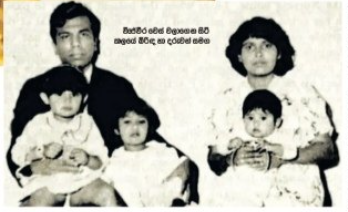The death of Janatha Vimukthi Peramuna (JVP) leader Rohana Wijeweera after his arrest by the army is well known. What remains largely unknown is the story of how his wife and children were safeguarded in the aftermath. Thirty-six years after Wijeweera’s death on 13 November 1989, this account draws on the recollections of the officers who ensured their survival.
13 November 1989: A Nation at a Crossroads
It was around five in the evening. The crimson glow of the setting sun bathed Galle Face and the Army Headquarters in Colombo. Inside, there was a sense of relief: the mission to end the terror that had engulfed the country was complete. Less than twenty-four hours earlier, a decisive military operation had extinguished one corner of the fire that had consumed the nation.
Security at Army Headquarters was at its highest due to threats from both the JVP and the LTTE. Suddenly, soldiers at the gate noticed two women approaching on foot, carrying children. Their presence was unusual and alarming. At that moment, Army Commander Lieutenant General Hamilton Wanasinghe was leaving for his official residence, “Buddy House” on Bauddhaloka Mawatha. Soldiers, alert to possible attacks, stopped the women.
“I am Rohana Wijeweera’s wife. I want to meet the Army Commander,” one of them said. The soldiers were stunned. News of Wijeweera’s death that morning had spread nationwide. Could this really be his wife? They informed their superior. Just then, a vehicle bearing three silver stars—the insignia of the Army Commander—arrived. The military police explained the situation, and Wanasinghe ordered the women and children to be brought to his office.
A Decision of Compassion
Wanasinghe instructed his staff to serve tea and cake. As he looked at Wijeweera’s wife and children, memories of families who had suffered for serving the army flooded back—such as the mother of Lieutenant Padmasiri Udugampola, brutally murdered in Galle. Wanasinghe made a decision: Wijeweera’s family would be protected.
Colonel Janaka Perera, who had led the operation to capture Wijeweera, reassured Chitrangani Wijeweera of her safety. Perera later recalled:
“When I arrested Wijeweera, one of his children clung to my arm. He asked only one thing: ‘Don’t harm my wife and children.’ I promised. After handing him over in Colombo, I warned his wife to leave immediately and gave her the Army Commander’s direct number.”
Seeking Refuge
After Wijeweera’s death was announced, Chitrangani fled from house to house before finally approaching Army Headquarters. Her only request: security for her children. The President agreed, and Wanasinghe placed her under the care of the Army Women’s Corps. That night, she and her four daughters—while pregnant with a fifth child—were moved to the Women’s Corps Headquarters on Kinsey Road, Colombo, under Captain Mantri Perera’s supervision.
“We gave her the largest room, ensured proper meals, medical care, and deployed soldiers to assist her,” recalls retired Lieutenant Colonel Mantri Koswatta.
Despite personal risk—her own family home had been attacked by the JVP—Koswatta showed compassion, comforting the children when they cried.
Life Under Protection
After initial arrangements, Chitrangani was moved to the Commando Regiment Headquarters in Ganemulla for greater security. She was housed in an officer’s quarters fortified with metal sheets, guarded by commandos and supported by the Women’s Corps. Her nutrition and medical needs were carefully managed. Eventually, her youngest child, Uvindu, was born at the Army Hospital.
Chitrangani’s life story reveals the hardships she endured: forced into marriage under family pressure, living in hiding for years, and losing everything when the JVP was banned. After two years under army protection, schooling for her children became a challenge. The government relocated her to the Trincomalee Naval Base, where the Navy provided security and care. Even today, her accommodation remains at the Welisara Navy Camp.
A Rare Chapter in History
This account offers a rare glimpse into an extraordinary chapter of Sri Lanka’s history—where humanity prevailed amid violence and fear.
(Edited Translation of a article by Mihiri Fonseka in the Aruna newspaper)
